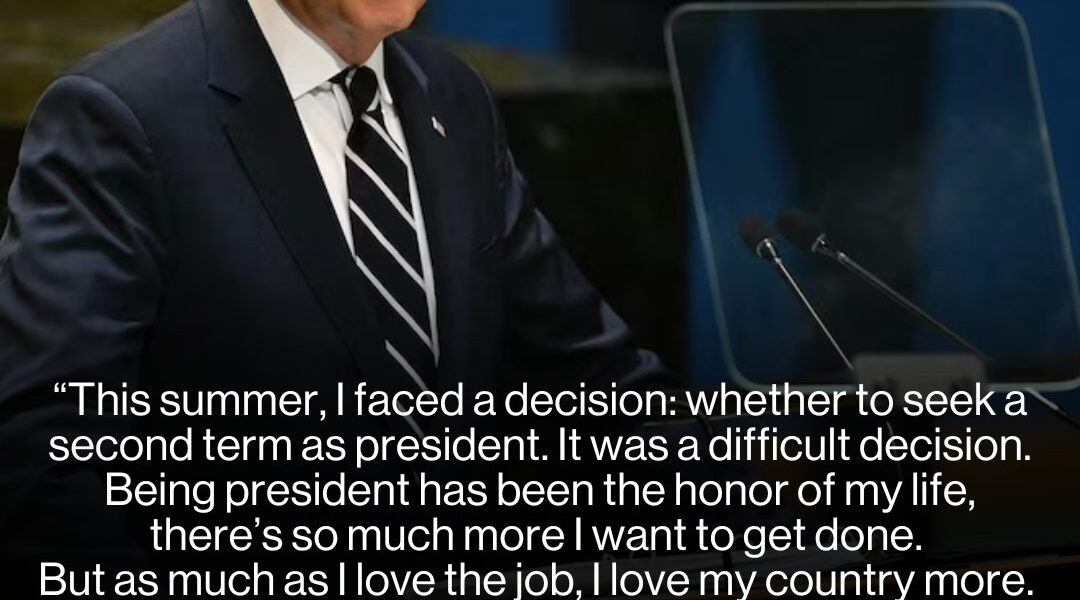President Joe Biden delivered his farewell address to world leaders at the United Nations General Assembly on Tuesday as he seeks to burnish his foreign policy legacy.
“This is the fourth time I’ve had the great honor speaking to this assembly as president of the United States,” Biden said as he began his remarks. “It will be my last. I’ve seen a remarkable sweep of history.”
But even though he came into office with decades of foreign policy experience, he leaves behind a mixed record.
Biden touted his administration’s rebuilding of alliances, saying when he came into office he was “determined to rebuild my country’s alliances and partnerships to a level not previously seen.”
“We did just that,” Biden said.

But the two wars that started under his administration have no clear end in sight.
His presidency is winding down as the conflict in Ukraine continues to rage and the risk of an all-out war between Israel and Lebanon increases.
The president has said a top priority before the end of his administration is to end Israel’s war against Hamas in Gaza, but negotiations to achieve a cease-fire have stalled.
Tuesday’s speech marked one of his last high-profile chances to rally world leaders.
“Will we sustain our support to help Ukraine win this war and preserve its freedom, or walk away, let aggression be renewed and a nation be destroyed? I know my answer,” Biden said. “We cannot grow weary. We cannot look away and we will not let up on our support for not Ukraine.”
Both Biden and Vice President Kamala Harris will meet separately with Ukraine’s President Volodymyr Zelensky at the White House later this week. Harris will not be at UNGA.

With nearly 500 people killed in Lebanon on Monday alone from Israeli strikes, the escalating tensions in the Middle East and the threat of an all-out war between Israel and Hezbollah, will surely overshadow other topics at the U.N.
Speaking on the escalation, Biden warned in his speech that “full-scale war is not in anyone’s interest.”
“Diplomatic solution is still possible,” he said. “In fact, it remains the only path to lasting security to allow the residents of both countries to return to their homes on the border safely. That’s what we’re working tirelessly to achieve.”
A senior administration said this meeting will allow for a range of officials to be in the same room to talk about the situation.
“This is one of the advantages of U.N. General Assembly. You literally have the whole world here. So, when you do have crises of the day, they’ll be addressed. And I have no doubt that the situation in the Middle East will be an important theme in a lot of a lot of the meetings, not just that the president has, but other senior U.S. officials who will be convening to talk about — about various aspects of the crisis and what we can do to stabilize the situation,” the official said.
“I think it’s an opportunity to talk about what we have achieved and what we what we still need to do, given a situation that is just heartbreaking where hostages have not been returned, the humanitarian situation in Gaza, and as you know, just such a sensitive issue, and such a delicate and dangerous situation between Israel and Lebanon right now,” the official said.
The president “should’ve been more outspoken from the beginning about what Israel is doing,” said Ian Bremmer, president and founder of Eurasia Group, adding that “Netanyahu constantly bites the hand that feeds him.”
Notably, even though Israel’s Prime Minister Benjamin Netanyahu will be at UNGA, there are currently no plans for Biden and Netanyahu to meet on the sidelines.
Where Biden has made strides is in stabilizing relations with China and strengthening alliances in the Indo-Pacific region: Biden launched a new security partnership with Australia, the U.K. and U.S. (AUKUS); he brought together Japan and South Korea — two countries with a rocky history — to work with the U.S. on defense and economic cooperation; Vietnam upgraded the U.S. to its highest level of diplomatic relations. (Biden is meeting with Vietnam’s general secretary this week.)
All of those relationships are part of Biden’s strategy to counter China’s influence in the region.


